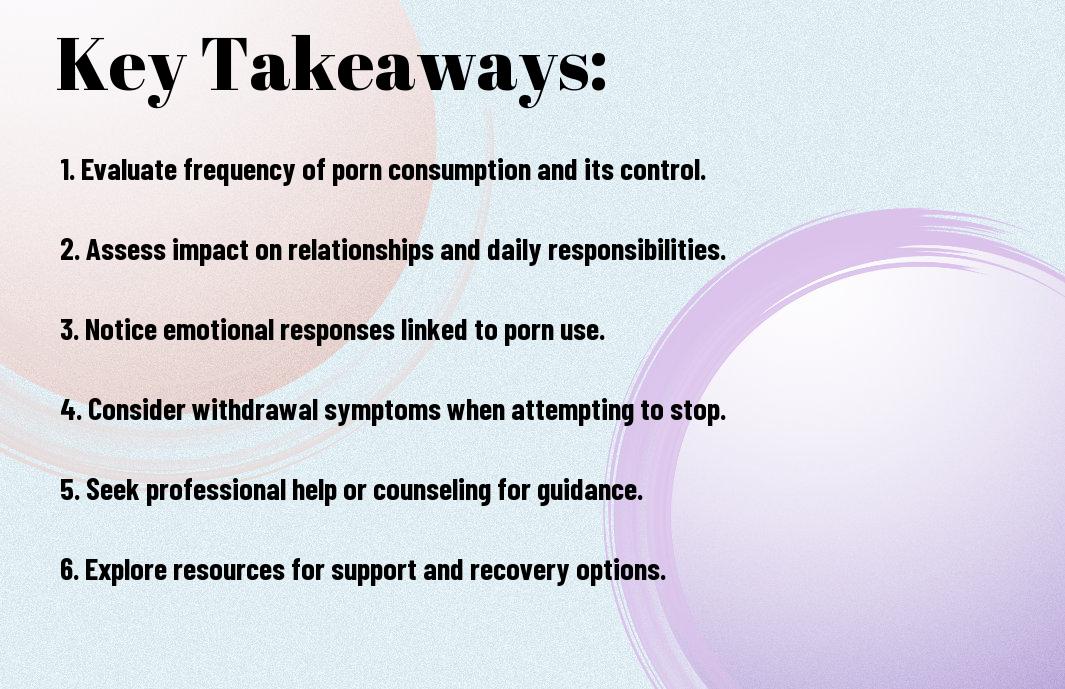Addiction to porn can significantly impact your life, relationships, and well-being. You may find yourself questioning your habits, but identifying a porn addiction can be confusing. In this post, we aim to provide you with five invaluable resources for 2025 that will help you evaluate your relationship with porn, understand the signs of addiction, and access support. Whether you’re seeking guidance for yourself or someone close to you, these resources are designed to empower you towards positive change.

Key Takeaways:
- Understanding the signs and symptoms of porn addiction is necessary for self-assessment and awareness.
- Utilizing online resources can help you identify patterns of behavior that may indicate a dependency on pornography.
- Engaging with support groups or therapy can provide guidance and strategies for overcoming porn addiction.
- Self-reflection on how porn consumption affects your daily life and relationships is important in recognizing potential addiction.
- Setting boundaries and limits on porn use can be a practical step towards recovery.
- Familiarizing yourself with expert literature can enhance your knowledge on the subject and inform your journey.
- Seeking professional help remains a viable option for those struggling to manage their porn use independently.

Understanding Porn Addiction
To effectively address porn addiction, it’s vital to first understand its complexities. Porn addiction is not merely about frequent consumption of adult content but involves a compulsive desire to engage with it, often despite negative consequences in your life. This behavior can be similar to other behavioral addictions, affecting emotional, psychological, and social aspects of your daily routine.
Definition of Porn Addiction
Behind the term “porn addiction” lies a compulsive use of pornography that interferes with your relationships, responsibilities, and overall well-being. It’s characterized by an inability to cut back or stop, despite awareness of the detrimental effects on your life.
Signs and Symptoms
Behind topics of interest in porn addiction are various signs and symptoms that indicate a potential issue. You may find yourself prioritizing porn over personal relationships, feeling unable to control your usage, or experiencing withdrawal symptoms when attempting to cut back. Other signs include escalating use of graphic content or neglecting everyday responsibilities.
To further assess your relationship with porn, consider how it impacts your emotional state or interpersonal connections. You might experience feelings of guilt or shame following consumption, find your self-esteem affected, or notice changes in your sexual functioning. If your engagement with porn is causing disruption or distress in your life, seeking clarification on these signs is an important step toward understanding and addressing the issue.

Assessing Your Relationship with Porn
It’s important to take a step back and evaluate your relationship with pornography. Understanding how it impacts your daily life, emotions, and intimate relationships can provide clarity on whether it has become a significant issue. Spend time reflecting on your usage patterns and feelings surrounding porn to assess its role in your life more accurately.
Self-Assessment Tools
At your disposal are various self-assessment tools designed to help you gauge your porn usage. These tools often include questionnaires and checklists that can illuminate your habits and feelings towards pornography. They allow you to gather insights that might reveal patterns you were previously unaware of.
Behavioral Patterns to Consider
Assessing your behavioral patterns is a key part of understanding your relationship with porn. Look for signs such as how often you watch porn, the contexts in which you engage with it, and whether it interferes with your daily activities or relationships.
Another important aspect to consider is your emotional response to pornography. Do you find yourself feeling guilt or shame after viewing, or do you use it as a way to cope with stress or loneliness? Identifying these patterns can help clarify if your porn consumption is a healthy outlet or a potential addiction needing attention.

Resources for Help
Not everyone realizes the extent of their dependency on pornography, and seeking help is a significant step toward recovery. Fortunately, numerous resources are available, from books to support networks, that can guide you through your journey. Understanding your triggers and addressing your habits can empower you to take control of your relationship with porn.
Books and Literature
Help is available in the form of insightful literature that addresses porn addiction, providing you with the tools and understanding needed to recognize and confront your challenges. Books written by experts in psychology and addiction offer valuable perspectives and strategies for managing your relationship with pornography effectively.
Online Support Communities
One effective way to tackle porn addiction is by engaging with online support communities that provide a safe space for you to discuss your experiences and seek encouragement from others on a similar path. These platforms can foster a sense of belonging and accountability, making the journey to recovery less isolating.
Indeed, online support communities offer diverse resources, including forums, chat rooms, and dedicated groups focused on overcoming porn addiction. These spaces let you connect with individuals who understand your struggles, share coping strategies, and celebrate milestones, making it easier for you to stay committed to your recovery goals. By participating, you gain access to a wealth of shared experiences and insights that can inspire and motivate you.
Professional Support Options
Now that you’ve recognized potential signs of a porn addiction, it’s imperative to consider professional support options tailored to your needs. Accessing resources can guide you to the help you require, whether it’s therapy or workshops. For more insights, check out the Top Five Warning Signs of Internet Pornography Addiction.
Therapy and Counseling
Behind every struggle with addiction lies the opportunity for healing through therapy and counseling. Engaging with a licensed therapist who specializes in addiction can provide you with personalized strategies and coping mechanisms to address your specific challenges and triggers.
Support Groups and Workshops
Between therapy sessions, support groups and workshops can offer a sense of community and understanding. Connecting with others who share similar experiences can help you feel less isolated and provide valuable perspectives.
Hence, participating in support groups and workshops not only facilitates sharing your journey but also fosters accountability and encouragement from peers. These environments often provide tools and resources to reinforce your recovery efforts, ensuring you have the support needed to overcome challenges effectively.
Long-term Strategies for Overcoming Addiction
Once again, addressing porn addiction requires a multifaceted approach that focuses on understanding and redirecting your behaviors over time. Long-term strategies may involve therapy, mindfulness practices, and creating a structured daily routine that promotes healthier habits. By implementing these techniques, you can develop resilience against triggers and significantly reduce your reliance on pornography.
Healthy Coping Mechanisms
Any effective recovery journey requires you to find healthy coping mechanisms that can replace your previous reliance on porn. Engaging in physical activities, journaling, or practicing meditation can allow you to process emotions and relieve stress without falling back into old habits. Explore various options to discover what works best for you.
Building a Support Network
Behind every successful recovery is a solid support network that holds you accountable and encourages your progress. Connecting with friends, family, or support groups can provide invaluable understanding and motivation. Sharing your experiences and challenges with others can help you feel less isolated on your journey.
Network with others who are on a similar path to enhance your recovery experience. Consider joining online forums or local support groups where you can interact with individuals who face the same struggles. This community can offer solidarity, share insights, and inspire you through shared stories of growth and resilience. By establishing meaningful connections, you create an environment that fosters change and promotes healing.
To wrap up
Presently, understanding whether you have a porn addiction is vital for your mental and emotional well-being. By utilizing the five vital resources outlined, you can gain insight into your habits and their impact on your life. Recognizing the signs and seeking help when needed can empower you to take control of your relationship with pornography. Don’t hesitate to explore these avenues; taking the first step towards awareness can lead to healthier choices and a more fulfilling life.
FAQ
Q1: What are some signs that I might have a porn addiction?
A: Common signs of a potential porn addiction include spending excessive time viewing pornography, feeling unable to control or reduce consumption despite wanting to, experiencing negative impacts on relationships or personal life, and using porn as a way to escape from stress or emotional issues.
Q2: How can I differentiate between regular use and an addiction?
A: The difference often lies in the impact on your daily life. If consuming porn interferes with responsibilities, social interactions, or mental well-being, it may suggest an addiction. Compare your viewing habits with those of your peers to find benchmark behaviors.
Q3: What resources can help me understand my relationship with pornography?
A: There are various resources available, including support groups, educational websites, self-help books, and online community forums, which can provide insight into the effects of porn and strategies to address potential addiction.
Q4: Can porn addiction affect my relationships?
A: Yes, porn addiction can lead to issues in relationships by fostering unrealistic expectations about intimacy, causing feelings of shame, or leading to secretive behavior. It can also diminish sexual satisfaction with partners, compounding emotional distance.
Q5: Is it possible to recover from a porn addiction on my own?
A: Some individuals have found success in reducing or eliminating their porn use independently through self-reflection and willpower. However, many benefit from professional help or support groups to guide them through the recovery process and provide accountability.
Q6: What role does technology play in porn addiction?
A: Technology can both contribute to and help mitigate porn addiction. While easy access to adult content online increases consumption, apps and tools exist that can block or limit access to adult websites, providing support for those trying to quit.
Q7: How can I talk to someone about my concerns regarding porn addiction?
A: Approaching a friend, family member, or mental health professional can be beneficial. Choose someone you trust, express your concerns clearly, and discuss openly about your feelings. Many professionals can offer guidance on managing addiction and coping strategies.
